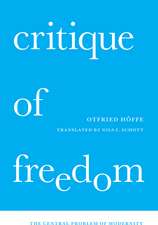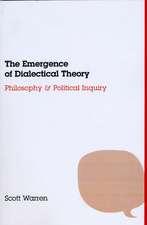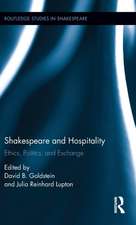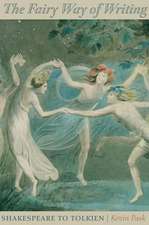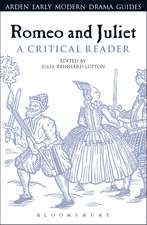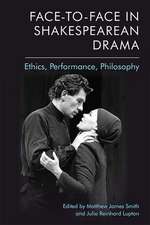Thinking with Shakespeare: Essays on Politics and Life
Autor Professor Julia Reinhard Luptonen Limba Engleză Paperback – 4 oct 2019
What is a person? What company do people keep with animals, plants, and things? Such questions—bearing fundamentally on the shared meaning of politics and life—animate Shakespearean drama, yet their urgency has often been obscured. Julia Reinhard Lupton gently dislodges Shakespeare’s plays from their historical confines to pursue their universal implications. From Petruchio’s animals and Kate’s laundry to Hamlet’s friends and Caliban’s childhood, Lupton restages thinking in Shakespeare as an embodied act of consent, cure, and care. Thinking with Shakespeare encourages readers to ponder matters of shared concern with the playwright by their side. Taking her cue from Hannah Arendt, Lupton reads Shakespeare for fresh insights into everything from housekeeping and animal husbandry to biopower and political theology.
Preț: 284.45 lei
Nou
Puncte Express: 427
Preț estimativ în valută:
54.44€ • 56.24$ • 45.30£
54.44€ • 56.24$ • 45.30£
Carte tipărită la comandă
Livrare economică 25 martie-08 aprilie
Preluare comenzi: 021 569.72.76
Specificații
ISBN-13: 9780226710198
ISBN-10: 022671019X
Pagini: 312
Ilustrații: 3 halftones
Dimensiuni: 152 x 229 x 25 mm
Greutate: 0.46 kg
Editura: University of Chicago Press
Colecția University of Chicago Press
ISBN-10: 022671019X
Pagini: 312
Ilustrații: 3 halftones
Dimensiuni: 152 x 229 x 25 mm
Greutate: 0.46 kg
Editura: University of Chicago Press
Colecția University of Chicago Press
Notă biografică
Julia Reinhard Lupton is professor of English and comparative literature and associate dean for research in the School of Humanities at the University of California, Irvine. She is the author of Shakespeare Dwelling: Designs for the Theater of Life.
Cuprins
Acknowledgments
A Note on Texts
Introduction
A Note on Texts
Introduction
ONE / Animal Husbands in The Taming of the Shrew
TWO / The Hamlet Elections
THREE / All’s Well That Ends Well and the Futures of Consent
FOUR / Job of Athens, Timon of Uz
FIVE / Hospitality and Risk in The Winter’s Tale
SIX / The Minority of Caliban
SEVEN / Paul Shakespeare
Epilogue / Defrosting the Refrigerator with Hannah Arendt
Bibliography
Index
TWO / The Hamlet Elections
THREE / All’s Well That Ends Well and the Futures of Consent
FOUR / Job of Athens, Timon of Uz
FIVE / Hospitality and Risk in The Winter’s Tale
SIX / The Minority of Caliban
SEVEN / Paul Shakespeare
Epilogue / Defrosting the Refrigerator with Hannah Arendt
Bibliography
Index
Recenzii
“Julia Lupton is one of the most interesting critics writing on early modern literature today. In her previous work, Lupton has engaged in a remarkable exploration of modes of citizenship and community. In this new book, she extends this work, offering a dazzling meditation on Shakespeare's relevance for Renaissance and contemporary thinking about Jewish and Christian orders of politics and life. Ranging widely from Aristotle and St. Paul to Arendt, Schmitt, Agamben and Virno, Lupton provokes us to rethink our own commitments to literature and to public life.”—Victoria Kahn, University of California, Berkeley
“Capacious, charmingly written, brilliant and innovative in its readings, and bracing in its challenge to business as usual in Shakespeare studies, this book is an extraordinary intellectual achievement. There is no reaching after relevance here; it simply falls, like ripe fruit, into Julia Lupton’s expertly placed hand.”
“Julia Lupton’s fabulous Thinking with Shakespeare takes Shakespeare fully into politics and visits Hannah Arendt at home. These are not the only reversals enacted in this wonderful salon-text, in which improbable conversation partners meet to discuss always timely topics (virtue, hospitality, consent, biopolitics, theology) and laughter as well as insight ensue. Lupton is an expert reader of texts who finds something new even in the most well worn terrain. Everyone with an interest in citizenship, no matter their disciplinary home, should read this book.”
“The book offers fresh, lucid interpretations in chapters dedicated to The Taming of the Shrew, Hamlet, All’s Well That Ends Well, The Winter’s Tale, and The Tempest. Lupton convincingly explores ‘the special appointments between politics and life’ staged by these plays. . . . An extensive bibliography makes this fine book even more useful to interdisciplinary readers interested ni the fate of Shakespeare among political philosophers today.”
“[Lupton’s] book is a feat of interdisciplinarity, reflecting an erudition of Shakespeare scholarship, literary theory, and political theory that is profound and deeply impressive, and written with artful prose that is playful and smart. . . . Her book must be read not only as a leading scholar’s expert interpretation of Shakespeare but an invitation to political theorists of all types to find sustenance in the Bard.”
“Thinking with Shakespeare is a fertile, inventive, erudite book offering a vision of Shakespeare’s plays as uncontained by what we usually take to be implied by the ‘political.’”
“Extraordinary. . . . There is a definite tilt to the future in all of [Lupton’s] essays here—and with a decidedly hopeful cast. The results are always bracing, often stunning, and even when wrenching, maybe especially when wrenching, they provoke a salutary thinking and rethinking of life and politics with Shakespeare.”
“Thinking with Shakespeare is an important book, urgently written and passionately argued. It demonstrates the continuing relevance of Shakespeare for contemporary ethics and politics and it makes a strong claim for the capacity of literary criticism to address in a serious and substantive way the question of human flourishing. . . . Shakespearians, Early Modernists, and political theorists will all profit from Lupton’s conceptually rigorous and imaginatively sensitive readings of the plays.”
“Lupton’s work is so unique in its attention to detail as well as circumspect in its understanding of the seeming mundane that her study of “biopolitics”—life and politics—succeeds in reanimating these now-routine terms in Shakespeare’s plays. . . . The real innovation of Lupton’s book is her exposition of details that most readers and viewers of Shakespeare take for granted. She demonstrates, through and not merely in Shakespeare’s plays, how political relations should be mediated by an Arendtian (via Aristotle) concept of virtue and that such virtue is visible especially in human interactions with the domestic and immediate—one’s household, friends, animals and provisions.”


